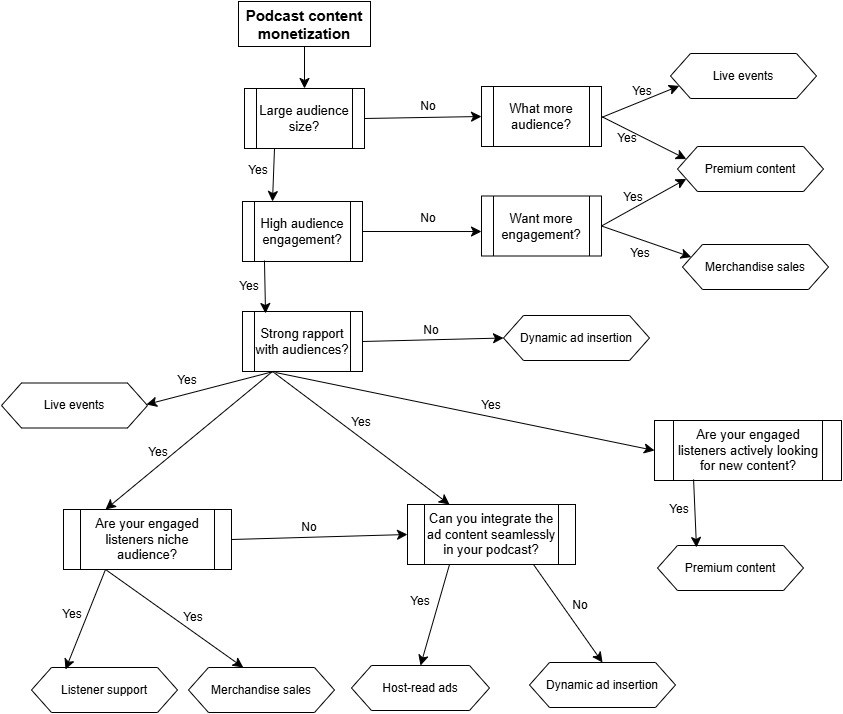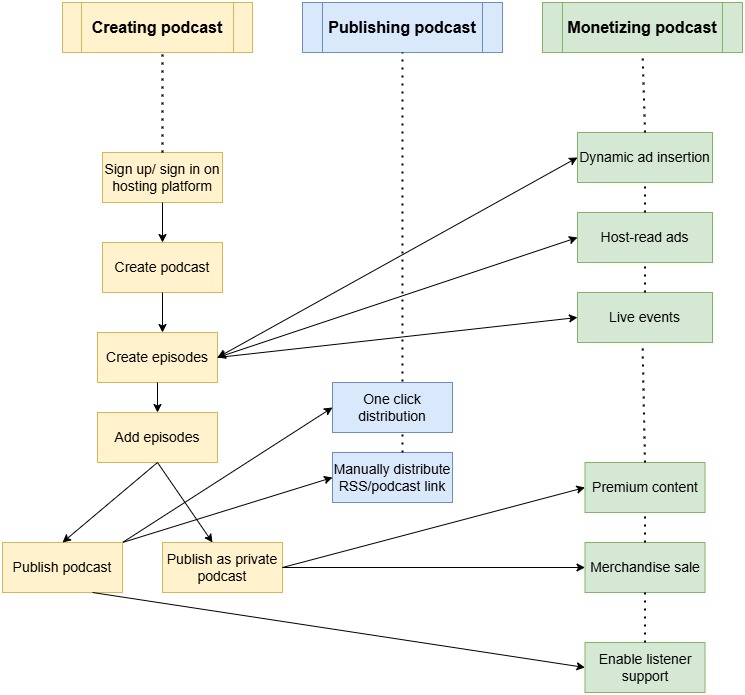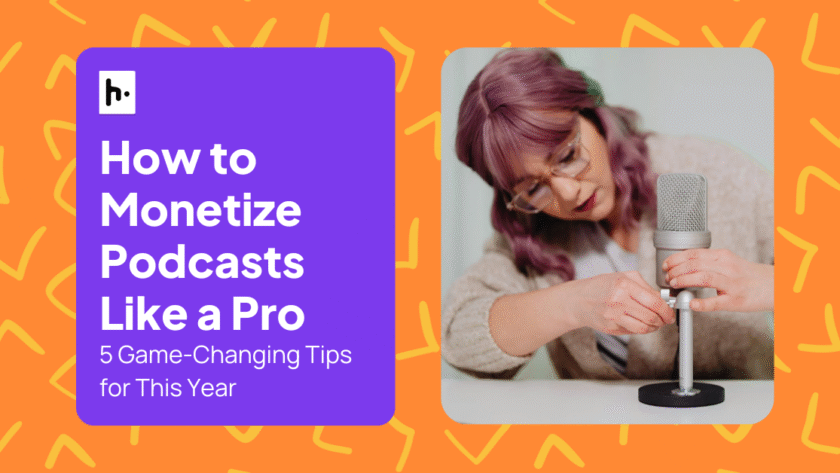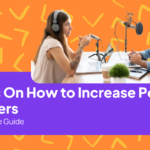So you’ve started podcasting and are gaining a steady following. Congrats on that! Now, how about turning it into a steady income source? Worry not, Hubhopper’s here to help. We tried and tested, and here are the 5 best podcast monetization strategies for 2025 that actually work.
Here, we will cover:
- The best monetization strategies for 2025
- A practical action plan on how to monetize podcasts and start earning ASAP
Let’s jump right in.
Podcasting is booming in 2025. With over 6.5 million podcasts currently on air, it has proven to be a lucrative career option. Most podcasters get into the scene to pursue their interests, but many have earned a name and wealth in the process.
As a beginner, you might be wondering how to get paid podcasting and turn it into a full-time profession. Well, there are a few simple ways in which you can earn with your passion. But before we get into that, let’s get a good grasp on the basics of podcast monetization.
Table of Contents
How to Monetize Podcasts?
There are two main ways in which you can monetize a podcast: direct and indirect.
Direct Monetization: This is exactly as it sounds. You turn your podcast into a money-making tool itself. An example is the Spotify Partner Program. With this, you will earn 50% of the revenue Spotify earns every time a monetized ad plays in your episodes. Other avenues include:
- Uploading premium content available via subscriptions.
- Uploading crowdfunding links such as GoFundMe and Kickstarter.
- Sponsorships from top brands relevant to the type of podcast you make.
Indirect monetization: This, on the other hand, takes your podcast beyond the platform. If your podcast becomes successful enough, you can implement different avenues. These include:
- Selling your branded merch with your logo or designs.
- Offering affiliate links.
- Hosting webinars, conferences, and sessions.
- Selling additional services like online courses, coaching, etc.
What Are The Top Monetization Strategies For Podcasters?
Here, we will discuss 5 podcast strategies that are proven to work.
1. Host-read ads
Advertisements that are read aloud during the podcast and become part of the content are host-read ads. This monetization strategy is being implemented by many since it helps build the authenticity of the brand, product, or service. And there’s data to support this; a Deloitte survey found that 75% of listeners listen to what their favorite hosts say.
This denotes great influence; a host, in this case, becomes an influencer.
2. Dynamic Ad Insertion
Hubhopper takes monetization with ads one step further with Dynamic Ad Insertion (DAI), which takes out the hassle of editing your podcasts. Hubhopper’s intelligent system ensures post-and-pre-roll ads are inserted into your episodes, offering a hassle-free and scalable monetization avenue. You automatic insertions, you save time, increase your revenue opportunities, and are able to focus on polishing the actual content.
3. Listener support
This refers to getting your listeners to support your content by donating small amounts or accessing subscriber-only content and materials via platforms such as Patreon.
4. Merchandise
How to monetize podcasts by moving beyond the platform? Well, podcasters can sell T-shirts, coasters, keychains, and other memorabilia with the logo or image of the content as a means of promoting the content while maintaining a steady flow of income.
5. Premium content
High-value, detailed content that is available to listeners only if they pay for a subscription is called exclusive or premium content. These are usually ad-free, targeted content such as tutorials, case studies, etc.
6. Live events
These include conferences and workshops where podcasters interact directly with their audience. Participants can be charged a small entry fee, which counts as income from live events.
But before we delve any deeper, here’s a disclaimer. These monetization strategies we are talking about are effective. But they are not one-size-fits-all.
For instance, 46% of listeners say they are not bothered by podcast ads. But yours might fall within the remaining section that finds such ads intrusive. So, it is important to pick the ones that suit your podcast style, content, and most importantly, will be welcomed by your audience.
Here is a decision tree to help you decide when to use each monetization strategy.

Comparing The Top Podcast Monetization Strategies
At a glance, here’s how the top podcast monetization strategies measure up against each other:
| Monetization Strategy | Host Read Ads | Listener Support | Merchandise | Premium Content | Live Events |
| Description | Sponsored ads read by the podcaster | Patreon, Buy Me A Coffee, GoFundMe | Custom merch | Early access and bonus episodes | Webinars, Q&A, meetups |
| Revenue Potential | High | Moderate | Variable | High | Moderate to High |
| Best For | All types of podcasts | Personal or niche podcasts | Entertainment podcasts | Series, storytelling, and educational podcasts | Interview-type podcasts |
| Scalability | High | Moderate | Moderate to High | High | Low to Moderate |
| Pros | Acts as passive income | Help build community support | Brand promotions | Caters to fans | Fan engagement |
| Cons | Requires high-paying sponsors and a good listener base | Support base may fluctuate | May require inventory and setup | Requires consistency and quality | Complex logistics |
How Do Host-read Ads Help Monetize Podcasts?
If you are wondering how to get ads on your podcast, there are three ways: dynamic pre-recorded ads, host-read ads, and sponsored content. Among these, host-read ads have a higher conversion rate.
Every podcaster builds a relationship with their audience, and host-read ads leverage this. Since the host speaks of the brand or product during the podcast, more people tend to listen and buy into the ad. This is particularly true when we look at age groups; 50% of the younger listeners (read Gen-Z and millennials) find the same advertisements more authentic when a favorite host talks about them.
What makes host-read ads an effective strategy for podcasters?
Host-read ads are an engaging way to draw attention to a certain product, service, or brand. Since these become part of the content, the podcaster is able to build a connection with the ad, making it easy for the audience to recall.
Further, it contains the host’s opinions, giving these ads a layer of authenticity. Thus, these have a higher success rate as compared to prerecorded ads that play before the podcast.
How to integrate ads naturally into your episodes
Let’s check out how to earn money podcasting with the host-read ads:
- Select a podcast that aligns with the product of the ad.
- When speaking, talk only of the product when it is relevant.
- Name drop the product in a manner that is not promotional but informative.
- Include a subtle CTA that urges people to try out the product.
- Do disclose that your content contains paid promotions.
- Track key metrics of the podcast to check if it receives engagement.
What Is Listener Support, And How Can It Grow Your Revenue?
Listener Support is a form of crowdfunding, where people like your content and pay you to make more. Instead of asking people to subscribe to exclusive content, you can simply appeal to people to support your efforts to create a podcast.
Though only 25% of podcasts among those that seek crowdfunding and listener support meet their goals, it is still a viable way to generate revenue.
The link asking listeners to support the podcast is placed in the podcast description, episode description, or on the podcast website. By clicking on this link, you will be taken to a payment portal where you can contribute a small amount in support of the podcast.
Some Platforms for Listener Support
The best and most popular podcast monetization platforms that you can use to implement listener support are:
- GoFundMe: This platform gives creators an easy way to raise money from their community of followers. To run a GoFundMe, you need not create exclusive content.
- Patreon: Allows creators to launch and run a digital shop, Patreon is tailored to exclusive content and subscription packages.
- Buy Me A Coffee: Using a referral link, supporters can buy you a metaphorical coffee, i.e., pay you in small tips for your content.
- Kickstarter: Somewhat similar to Patreon, Kickstarter allows people to raise funds for a particular project. However, the people who pledge their funds only have to pay if the project achieves its funding goal.
How to implement listener support
Let’s get a brief understanding of how to make money off your podcast with listener support, which is one of the easiest ways out there.
- Create an account on your preferred platform, such as Patreon, GoFundMe, etc.
- Add the links for your Listener Support platform to your website and podcast.
- Request payment and/or offer exclusive content when a listener clicks on these links.
- You may speak about why people should contribute during your podcast.
- Redeem what you receive from the Listener Support Platforms.
Can Selling Merchandise Make Money For Podcasters?
The answer is a resounding yes when it comes to using merch as a podcast monetization strategy. A strategy used not just by podcasters but also by entertainers, merch sales can contribute significantly in terms of revenue.
Further, selling fan memorabilia is an excellent way to engage with the audience.
Tips to design podcast merch that your audience will love
T-shirts, hoodies, tote bags, mugs, water bottles, and stickers are some of the most popular types of merchandise that podcasters offer. Consider a range of designs that resonate with your brand identity and carry your logo.
Keep the design on your merch simple and incorporate references from the show. Choose a platform such as Printful or Redbubble to print your merch. Price your merch according to market rates and production costs.
Designing and selling podcast merch
The steps to follow for how to sell podcast merch are given as follows
- Understand what your audience likes.
- Design your merch using tools like Adobe Illustrator or Canva.
- Find a manufacturer such as Printful or Printify.
- Set up an online store.
- Add the links to buy merch on your podcasts and social media.
What Is Premium Podcast Content, And How Do You Offer It?
Learning how to monetize podcasts by using premium content is a must for all podcasters. Premium content refers to that which is not a part of your general feed and is available only to subscribers.
With podcasters charging anywhere between USD 3 – 20 per month per subscription, this is a good source of revenue if you can regularly post high-quality content.
This usually includes bonus episodes, ad-free content, extended scenes, etc. Since people pay to access this content, it forms an important part of the podcast monetization strategy.
Examples of premium content that listeners pay for
Some ideas for premium content that your listeners will pay to access include:
- Extended or Specialized Content: Longer, full-featured content for paying listeners.
- In-depth tutorials: You can post parts of a tutorial as free content and provide a detailed version to those who pay for it.
- Infographics: Create simple summaries of complex topics and offer these to your subscribers.
- Enhanced experience: Behind-the-scenes content, Q&A sessions, ad-free material, and early access content count towards an enhanced listener experience.
How to set up paid subscriptions
Most podcast platforms allow you to set up a paid subscription for your podcasts. However, the steps may differ depending on the platform, though the basics will remain the same.
The steps you will have to follow include:
- Create a subscription,
- Review the terms of the subscription,
- Set up availability,
- Set up a payment gateway,
- Upload the exclusive content,
- Promote it, and
- Monitor and optimize the content.
How Can Podcasters Earn From Live Events And Workshops?
Live events and workshops are not just a way for podcasters to build a connection with their audience, but also to gain some revenue. This is done through ticket sales, sponsorships, and paid partnerships that you receive.
These live events usually contain webinars, seminars, and workshops where your listeners either learn new skills or get to interact with a certain person through a Q&A session.
Organizing successful live podcast shows
Interacting with listeners is a good way to build an audience base. One method is speaking to fans live and monetizing their conversations in the podcast as a Q&A session. Basically you host a paid Q&A session where you prompt fans to pay you and ask questions live and you answer them. You can also set up webinars on a particular date, announce the event beforehand, and ask for a small fee from those who wish to join.
Other than that, a live event allows you to engage directly with your audience and record their reactions. Further, your listeners also feel more invested in the podcast, which in turn, can increase your audience base.
Making money through ticket sales, sponsors & merch
After organizing a live event, workshop, or webinar, you can ask for money as a ticket or entry fee. Further, after the workshop, you can offer merchandise and that becomes an additional stream of revenue.
You can also seek sponsors for your event and make money from ads and sponsorship. Additionally, you can opt for a paid partnership or team up with other podcasters to gain more participants in your event.
Creating a Podcast Monetization Action Plan
As much as we speak of podcast monetization strategies, a solid plan is the answer to the question, “Can you get paid for podcasts?”
Step 1: Check out which monetization tips suit your podcast business.
Step 2: Study the type of audience your podcast is attracting.
Step 3: Select avenues to monetize your podcast based on this.
Step 4: Create an account on podcast monetization platforms such as Patreon or Buy Me A Coffee.
Step 5: Design apt merch ideas that align with your podcast.
Step 6: Set up shop with print-on-demand businesses like Printful or Printify and e-commerce platforms.
Step 7: Create exclusive content that is good enough to be subscriber-only and upload it.
Step 8: Promote your podcast, along with exclusive content and merch, using social media to grow a podcast.
Step 9: Connect with sponsors who are relevant to your podcast business and brand image.
Step 10: Insert pre-recorded and host-read ads in your usual content.
Step 11: Record separate paid or sponsored content if and when you receive the offer for one.
Step 12: Connect with your audience by organizing live events and workshops where you can charge for entry or sell more merchandise.
You can also monetize your podcasts using different strategies on a single hosting platform like Hubhopper. Here are the steps.

Let’s take a look at some numbers:
Let us assume you have 1000 subscribers, 100 of whom pay for their subscriptions. If your paid subscriptions cost USD 10 per month, you are making USD 1000 per month just from premium content. Then, let 2% of your audience buy merch every month, which gives you USD 20 a piece.
This makes USD 400 in merch sales. Suppose you get USD 50 for ads and have 5 sponsors; that makes another USD 250. Thus, your total monthly income adds up to USD 1650. While this figure might seem low, keep in mind that you can easily scale it up as your podcast becomes popular.
As your audience base grows, these podcast promotional strategies work cyclically, one leading to another. Further, the revenue from podcasts will help you grow your podcast channel.
Thus, you can easily learn how to start a podcast for free and make money from it.
Monetized Your Podcast? Here is How to Earn More
Your podcast earnings or income are not just limited to how many subscribers opt for premium content. Some strategies to boost monetizing your podcast are:
- Use the analytics offered by your podcast platform to check what kind of audience is accessing your work.
- Weigh the pros and cons of direct monetization techniques, such as paid partnerships, against those of indirect ones, like affiliate marketing and additional services.
- Lay down the groundwork for multiple indirect podcast income methods to act as your passive earnings.
- Improve the quality of premium content so that more people opt for it.
- Leverage listener support systems, such as Buy Me A Coffee, if you do not have one.
- Take feedback from your audience into account.
- Do not make your podcast overly commercial; instead, opt for a more balanced approach.
While there is money in podcasting, there is no one-size-fits-all approach. To top it off, podcasters need to strategize and work on their own plans for podcasting for profit.
Further, maximizing revenue from podcasts should be done keeping a long-term strategy in mind, since making a podcast overly commercial or filled with ads can lead to you losing your audience.
Here’s how Hubhopper can Help
More than 40 brands trust Hubhopper for its ability to grow their impact and revenue. Hosting more than 1,100 million global listens and over 24 million hours of live content, Hubhopper offers a variety of monetization avenues to its 20000+ creators on board – from Dynamic Ad Insertion to sponsorships.
Key Takeaways
- Knowing how to monetize your podcast is essential to take it beyond a hobby.
- The right podcast monetization strategy depends on your audience size and engagement levels.
- Direct strategies like host-read ads work better when audiences are engaged and loyal.
- Strategies like dynamic ad insertion work when the advertisement can be seamlessly integrated with your podcast content.
- Indirect strategies like merchandise selling also work well when the size of audience is large.
- Aim for listener support if you have a large and loyal audience base.
- Premium content strategy will work best when you have a loyal follower base who are waiting for more content from you.
- Premium content strategy can also work well if you have a large base of niche audience.
- Live event strategy will work if your listeners are loyal, engaged and niche enough to want to attend.
- It is essential to pick the right podcast monetization platform to maximize your earnings.
Final Thoughts: Which Podcast Monetization Strategy Is Right For Your Podcast?
Podcasting involves a lot of skill and hard work, making it important to monetise on. Older 2022 data revealed that only 41% saw podcasts as a way to supplement their income. Further, at present, only 26% are monetizing their work.
But learning how to monetize a podcast is a key lesson for all podcasters who wish to become professionals. However, not every method of how to earn money through podcasting will work for the type of content you upload.
Check the podcast monetization strategy that provides the best way to monetize podcast content. Then devise a way that helps you make the most out of your podcasts. You can manually set up subscriptions for your podcasts or get help from an expert like Hubhopper while setting up your monetization funnels.
Ready to make quick money from podcast monetization? Try the ad-insertion tools of Hubhopper or start selling merchandise with Hubhopper’s private podcast features. Podcast monetization through Hubhopper is simple and largely automated.
Frequently Asked Questions
Which is going to earn me more, direct or indirect monetization techniques?
This depends on how much time you can invest each day behind your podcast channel and the different monetization techniques. If podcasting is only a part-time gig for you, it is best to opt for passive monetization. Either way, a meld of both techniques will give you the most in terms of monetization.
What is the best podcast monetization platform?
Making the process of allowing ads completely hassle-free, Hubhopper is one of the best podcast monetization platforms out there. And we don’t say it lightly; we ensure every system in our platform is geared to the growth of your channel. Even our private podcasting option is completely customizable; you can choose to set up one-time paywalls or time-sensitive memberships for your audience- whichever suits you. And it’s completely zero effort; we take care of inserting ads post and pre-roll, and match you with advertisers.
How many subscribers must I have to monetize my podcast?
There is no lower limit, per se. If you are trying out strategies like dropshipping or affiliate marketing, you can start with as few as 1000 followers or even less. However, to receive sponsorships or get the most out of crowdfunding, it is better to have a large follower base.
How long will it take to start earning from my podcast?
With Hubhopper, you can start earning instantly! We offer Dynamic Ad Insertion, which adds pre-roll and post-roll advertisements to your episodes automatically and shows them to your target audience. As your audience base increases, so will your income.





